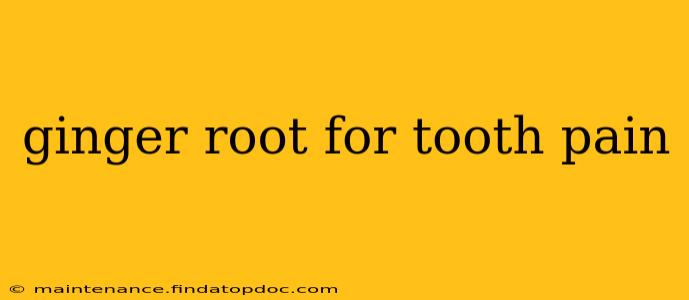Tooth pain is a universally unpleasant experience, often leading to sleepless nights and disrupted daily life. While a dentist should always be consulted for persistent or severe pain, many are exploring natural remedies for temporary relief. Ginger, a spice with a long history of medicinal use, is one such remedy gaining popularity. But does it truly work for toothaches? Let's delve into the potential benefits, limitations, and important considerations.
Does Ginger Actually Help with Tooth Pain?
Ginger's potential to alleviate tooth pain stems primarily from its anti-inflammatory and analgesic (pain-relieving) properties. Compounds like gingerols and shogaols, found abundantly in ginger, are responsible for these effects. These compounds can help reduce inflammation in the gums and potentially numb the pain caused by various dental issues, such as minor gum irritation or inflammation. However, it's crucial to understand that ginger is not a replacement for professional dental care.
How to Use Ginger for Tooth Pain Relief
There are several ways to use ginger for potential tooth pain relief:
-
Ginger Tea: Steeping a piece of fresh ginger in hot water creates a soothing tea. Allowing the tea to cool slightly before swishing it around the affected area can provide some relief. The warmth can also help relax the muscles in the jaw, further reducing discomfort.
-
Ginger Chewing: Chewing on a small piece of fresh ginger can directly apply the active compounds to the gums and teeth. The slight abrasiveness may also help remove some food particles that might be contributing to the pain.
-
Ginger Paste: A paste made by grinding fresh ginger can be applied directly to the affected area. This method allows for more concentrated application of the active compounds.
Important Note: Always use fresh ginger whenever possible for maximum efficacy. The potency of ginger's active compounds can decrease with processing and storage.
What Causes Tooth Pain?
Understanding the underlying cause of your tooth pain is crucial before considering any home remedy. Toothaches can stem from various issues, including:
-
Dental Cavities: These holes in the tooth's enamel expose the sensitive inner layers, causing pain.
-
Gum Disease (Gingivitis or Periodontitis): Inflammation and infection of the gums can lead to significant discomfort.
-
Abscesses: A pus-filled pocket near the root of a tooth can cause intense pain.
-
Cracked or Chipped Tooth: Damage to the tooth structure can expose nerve endings and result in sharp pain.
-
Teeth Grinding (Bruxism): This habit can lead to jaw pain and sensitivity.
-
Wisdom Tooth Problems: Impacted or infected wisdom teeth are a common cause of pain.
When Should You See a Dentist for Tooth Pain?
While ginger might provide temporary relief for minor tooth pain, it's not a cure-all and should not replace professional dental care. You should schedule an appointment with your dentist immediately if:
- Your pain is severe or persistent.
- You have swelling or inflammation in your gums or jaw.
- You have a fever or chills.
- You notice pus or bleeding from your gums.
- You have difficulty opening your mouth.
Can Ginger Treat All Types of Tooth Pain?
No, ginger is not a universal solution for all types of tooth pain. Its effectiveness is limited primarily to minor pain associated with inflammation or irritation. It is unlikely to be effective for severe pain caused by abscesses, deep cavities, or other serious dental problems.
Is Ginger Safe for Everyone?
Generally, ginger is considered safe for consumption in moderate amounts. However, some individuals may experience side effects such as heartburn, nausea, or diarrhea. Pregnant women and individuals with bleeding disorders should exercise caution and consult their doctor before using ginger for tooth pain relief.
Conclusion
Ginger might offer temporary relief from mild tooth pain due to its anti-inflammatory and analgesic properties. However, it is crucial to remember that it's not a substitute for professional dental care. If you are experiencing tooth pain, especially if it is severe or persistent, consult a dentist for proper diagnosis and treatment. Using ginger as a complementary approach, alongside professional dental care, could provide additional comfort, but should never replace a visit to the dentist for effective resolution of your toothache.
